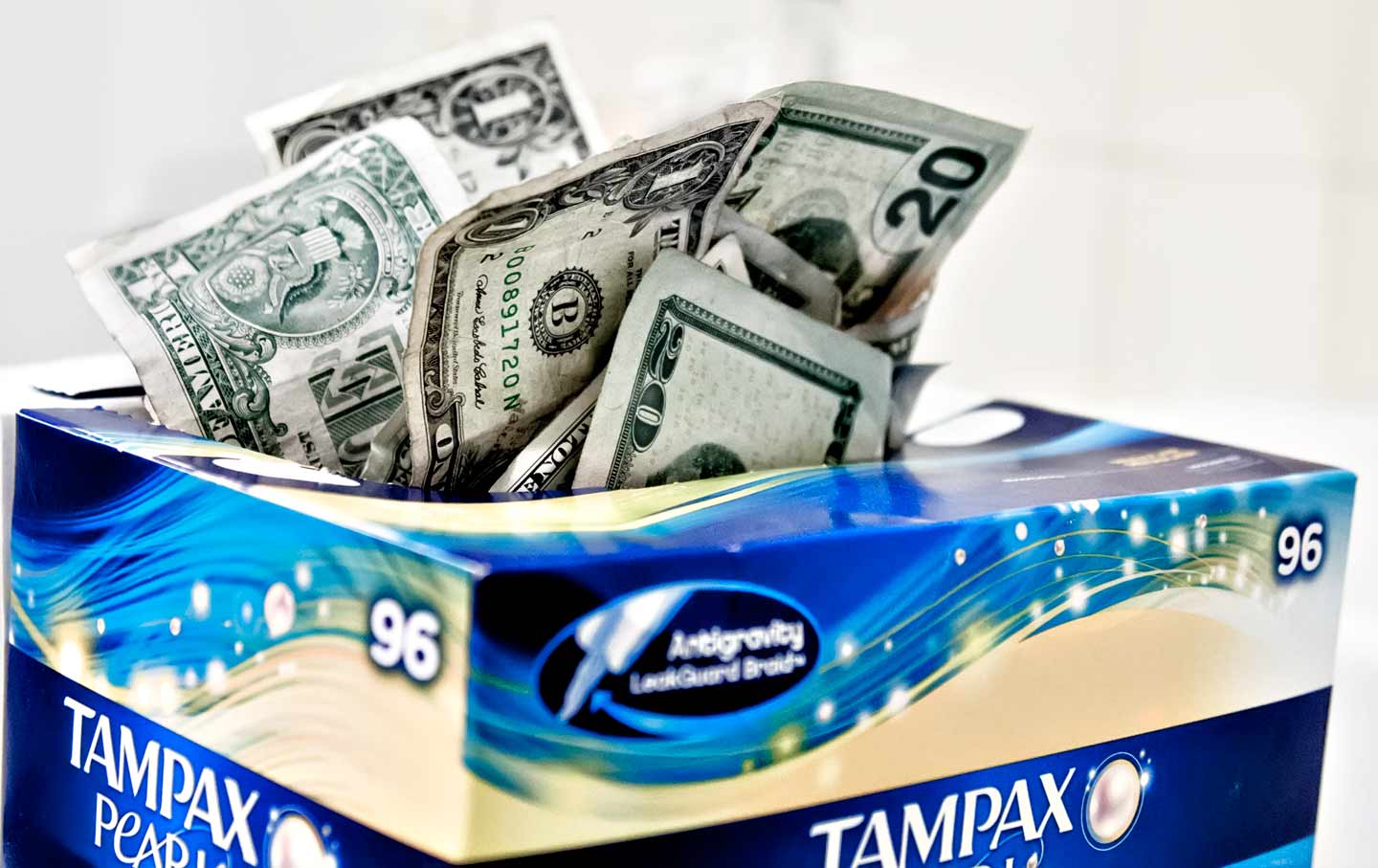Menstrual equity, a phrase coined by attorney and activist Jennifer Weiss-Wolf, means “[f]airness for how women are treated in society because they menstruate.” Current menstrual equity efforts run along three identifiable, parallel tracks:
(1) campaigns to repeal the state sales tax on tampons, pads, menstrual cups and similar products (as New York, Illinois, Connecticut and Florida have done in the last 2 years);
(2) efforts to make products more widely available in places such as public schools, jails and homeless shelters (like New York City did in 2016, making them available for free in all of these locations); and
(3) ensuring that menstrual hygiene products are safe for consumers, through mandatory labeling that identifies the products’ composition, such as would be required by the Menstrual Products Right to Know Act, legislation proposed in 2017 by Congressional Representative Grace Meng (D-NY).

Photo by Laura Epstein-Norris via The Nation (here: https://www.thenation.com/article/why-are-we-paying-sales-tax-on-tampons/)
I support all of these efforts. Together with Professor Carla Spivack (OKCU Law), I have written about Tampon Taxes, Discrimination and Human Rights, suggesting that the sales tax (or its equivalent) may be ripe for legal challenge.
My feelings are more mixed when it comes to what I will call menstrual capitalism, the marketing and selling of menstrual hygiene products by means of feminist messages that attempt to create a public-relations “halo effect” for companies that are, at their core, commercial enterprises that seek to profit from women’s bodies.
I love the pro-woman, body-positive messages of the “period proof underwear” by Thinx. I was outraged when the NYC subway system initially disallowed Thinx advertisements on the subway, alleging that they were “too controversial” (see news coverage here). Major kudos to Thinx for its educational initiatives in schools and providing funding for organizations that make menstrual hygiene products available to vulnerable women. It’s a company founded by three women (Yay! Except for the fact that one of the founders settled a major sexual harassment suit brought on account of her behavior in the workplace and ended up stepping down as CEO because of it…).
Let’s also not forget the female-founded subscription-based delivery service Cora, that will send organic tampons to your doorstep each month. And lest one hypothesize that menstrual capitalism is a U.S.-based phenomenon, the U.K.-based Pink Parcel “period subscription box” contains a monthly delivery of beauty products, sweets and tampons, so that you can “feel your absolute best even when your period rolls around” (as if menstruation were an illness….Is it heavy-handed to point out that Pink Parcel is male-owned?).
But what do all of these companies have in common? They want to make money from women’s bodies. Is that inherently a bad thing? No. All sorts of companies make money from women’s (and men’s) bodies. That’s the nature of capitalism. But let’s not confuse menstrual capitalism with non-profit organizations like Massachusetts-based Dignity Matters, NYC-based Racket, or Florida-based For the Love of Women (FLOW), organizations that get menstrual hygiene products in the hands of women who need them most, such as women in homeless shelters and low-income women, without making any kind of money from the venture. Also, Period Equity, the brainchild of Jennifer Weiss-Wolf and Laura Strausfeld, is “the nation’s first law and policy organization fighting for menstrual equity – committed to ensuring that menstrual products are affordable, safe and available to those in need.” Those non-profits do not have the funds to buy provocative ads to adorn the subway system, but they are highly deserving of support.
I accept the marketplace as a part of the society I live in. I benefit from the market economy and the laws that support it. Yet menstrual capitalism occasionally goes too far. Does anyone really need a “period blanket” to make “period sex SO much easier“? Last I checked, a willing partner and a dark towel work just fine, and won’t set you back £ 285 (about $379).
If it makes someone happy to purchase a period blanket, more power to her. Just don’t call it a feminist act. It’s menstrual capitalism.

